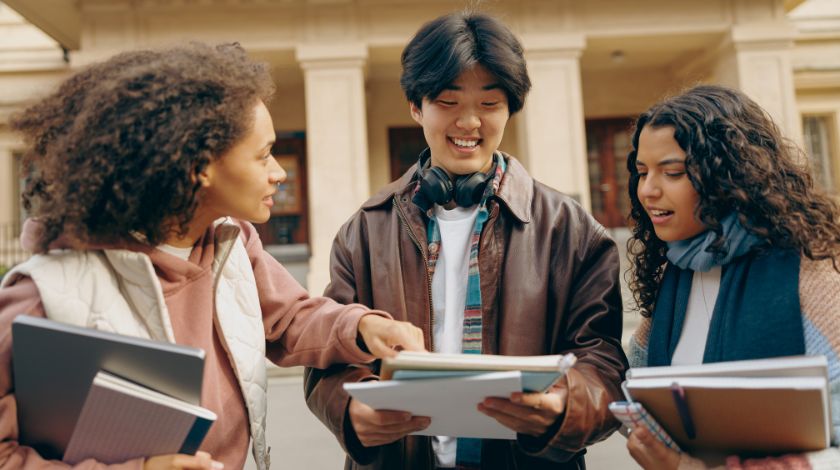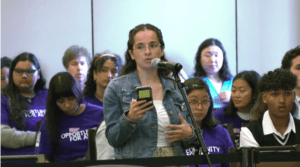News and Announcements
How an OER Student Fellow Advanced Textbook Affordability at UCLA
Published Date
- January 4, 2024

By Kaitlyn Wagman
I believe higher education accessibility is essential to ending societal inequities. As a first-generation college student, I always knew college was the only way I could “get out,” which resonates with many people. Once students get into college, however, they are then faced with many fees—countless extra fees that need not exist and only serve to create more barriers to knowledge. Even for students such as myself, who receive state scholarships that cover tuition, course materials still cost hundreds of dollars per quarter/semester. Textbooks, lab coats, goggles, etc are not included in our tuition or our scholarships. These are all out-of-pocket costs, meaning that even with scholarships we worked so hard to get, we still have to work multiple jobs (three, in my case) to pay for college expenses, even at public institutions.
I knew something had to change, which is why I decided to apply for the Michelson 20MM Foundation Textbook Affordability Fellowship. Throughout the program, I have focused on two major goals: getting student representation on the University of California Office of the President (UCOP) Textbook Affordability Task Force and implementing course marking at the University of California, Los Angeles (UCLA).
In 2022, Governor Newsom instructed the University of California administration to create task forces to examine different areas of basic needs for students, one being ways to lower the out-of-pocket costs students pay for their courses. The roster for this “textbook affordability” task force, however, is made up of administrators and fails to include the experts in this field: students, professors, and librarians. The University of California has a history of making decisions for students without student say, and this is happening now with textbook affordability. As a Textbook Affordability Fellow and student at UCLA, my goal was to ensure that students could see and approve the proposal the task force drafts before it is sent to the UC Regents as a policy recommendation. Over the course of the year, I was able to get the preliminary inventory report released to students, allowing for greater transparency and accountability. Additionally, we have created an oversight committee for UCLA’s representative on this task force to ensure that all low-cost initiatives are included in this report, so we can later ask for funding and institutionalization of these programs. I will continue to work toward getting a permanent agreement of student oversight across all campuses.
As for course marking, the UC system has no such initiative, even though it was requested by the California Legislature when SB 1359 made it mandatory for California State Universities (CSUs) and community colleges. Course marking would be a significant stride towards transparency as it allows students to see what classes are “low cost” as they enroll, allowing them to take charge of their financial planning and educational journey. Through my work, I was able to pinpoint people with whom students need to engage to implement course marking. I was also able to meet with the bookstore and the registrar to discuss how implementation might look.

As a whole, the fellowship has taught me valuable lessons about advocacy. I learned how to format and brainstorm a campaign for textbook affordability, including researching targets and developing a strategy. I learned the importance of building a coalition of diverse stakeholders, and saw how educating the masses is key to engaging people in the problem. I gave presentations at two different open education conferences and presented to many other organizations in the University of California system. I participated in campaign planning, outreach and recruitment, policy 101, power mapping, storytelling, media training, and resume building. These are skills I will take with me for the rest of my career.
My experience in this fellowship exemplifies the importance of giving students a platform when discussing higher education accessibility. Students are the ones being impacted, and by empowering them to make change, we are training the next generation of advocates. I would have never been able to accomplish so much progress at my university without this fellowship, and I am excited to see the kind of work programs like this will produce in the future.
Call for Applications: 2024 Student Fellowship Program
We are currently accepting applications for the Michelson 20MM Student Fellowship Program. If you are interested in joining Katie as a Student Fellow, consider applying today. This is a unique opportunity for California Community College (CCC), California State University (CSU), University of California (UC), or tribal college students to make a tangible impact in crucial areas of social change.
Whether your passion lies in addressing student basic needs, championing digital equity, promoting criminal justice reform, or advocating for textbook affordability, the fellowship empowers students to execute program-related projects on a campus, system, or statewide level. Join a community of fellows working toward a more inclusive and equitable educational landscape for all! Learn more and apply.
Michelson 20MM is a private, nonprofit foundation working toward equity for underserved and historically underrepresented communities by expanding access to educational and employment opportunities, increasing affordability of educational programs, and ensuring the necessary supports are in place for individuals to thrive. To do so, we work in the following verticals: Digital Equity, Intellectual Property, Smart Justice, Student Basic Needs, and Open Educational Resources (OER). Co-chaired and funded by Alya and Gary Michelson, Michelson 20MM is part of the Michelson Philanthropies network of foundations.
To sign up for our newsletter, click here.